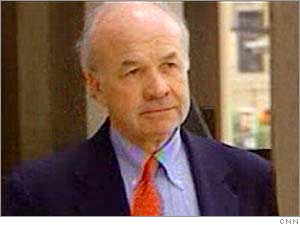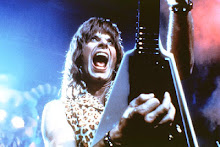Oh Kenny Boy, The Pipes Are Playing

Enron founder and chairman Ken Lay died of a heart attack today at age 64, at his Aspen vacation home. While they say one should not speak ill of the dead, it is important to note Lay's legacy and what it reveals about how business is done in George Bush's administration.
Lay was so close to President Bush, and so successful during the Bush administration, because they both stand for the same three things: lie, cheat and steal. Lay was convicted in two separate trials for different offenses. First, he was found guilty of defrauding investors and employees by repeatedly lying about Enron's financial strength before the Enron went bankrupt in December 2001. Second, Lay was convicted in a separate trial of bank fraud and making false statements to banks regarding his personal finances.
What Lay did that was legal is also interesting. He successfully used the U.S. government, run with our tax dollars, to enrich himself. In doing so, he found a very willing partner in George Bush, who called Lay "Kenny Boy." Lay was one of the largest personal and corporate contributors to the Bush campaign and the Republican party, but these contributions were mere investments that paid off handsomely. Lay was able to influence Bush administration policy to favor Enron. Beginning in late February 2001, Lay and other Enron officials took part in Vice President Dick Cheney's energy task force to write the energy policy for the Bush administration. While Cheney refused to release details about who participated and what they decided, since that kind of open government would look too much like an actual democracy, it is now known that the task force was comprised of oil and gas industry fatcats like Lay, and that the policy that was developed was the policy that these fatcats suggested, to benefit themselves rather than the country.
Another example of Lay's special treatment is that, when Bush came to office, he elevated Curtis Hebert, a Republican Commissioner of the Federal Energy Regulatory Commission (FERC), to Chairman of FERC. However, Hebert disagreed with Lay on a couple of key policy matters. Whoosh! By August of 2001, Hebert, who had three years left of his term, was ousted and Lay's hand-picked chairman, Pat Wood III, who had been Lay's hometown Texas Public Utilities Commission Chairman, was put in Hebert's place.
Still another prong of Lay's hold over the Bush administration was the placement of Enron executives in high positions throughout the Bush administration, where they could influence policy and help steer contracts in favor of Enron. These officials included Lawrence Lindsay, the White House Chief Economic Adviser, and Robert Zoellick, the U.S. Trade Representative. They also included Thomas E. White, who was named Secretary of the Army, after which Lay successfully gained Enron contracts to supply gas and electricity to U.S. military bases around the world as part of the vast privatization of the military that has taken place under President Bush. White was eventually implicated in some of the illegal fraudulent activities that took place under his watch at Enron. And Karl Rove reported up to $250,000 in Enron stock when he joined the Bush administration. It is quite likely that Ken Lay had more influence over the Bush administration's policies than any other private sector individual, and by an exponental factor.
While it is sad that Ken Lay died at age 64, one wonders how many Enron employees and investors have died prematurely, or who have suffered ill health without health insurance or savings because these were wiped out by Lay's lies and fraud. In the Bush White House, home to the likes of Ken Lay and Jack Abramoff, that's just business as usual.




0 Comments:
Post a Comment
<< Home